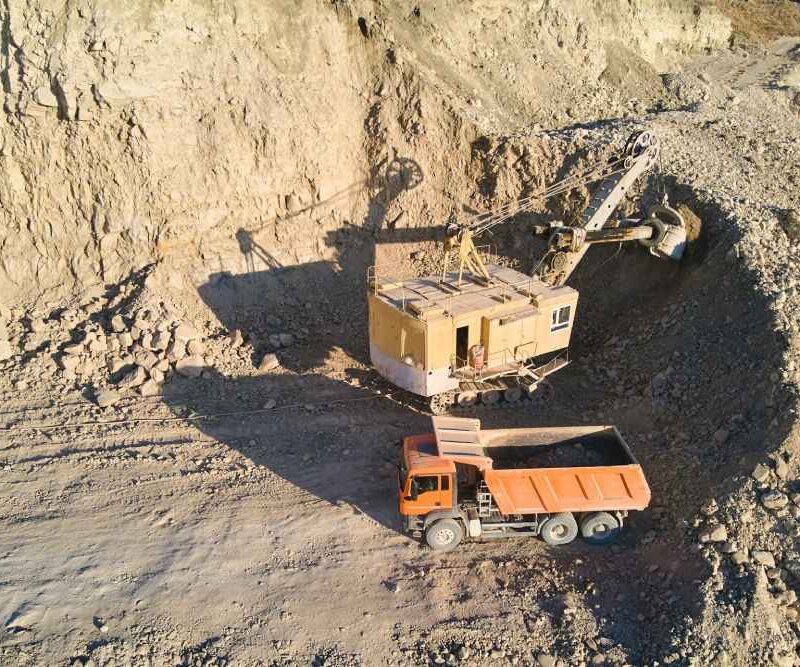The crux of quarry operations lies within the delicate and powerful rock fragmentation process, which relies on specialized rock blasting services. Mastery in this sphere means contending with and controlling the immense forces unleashed during drilling and blasting.
Innovative methods have emerged, such as electronic blasting systems, which do more than shatter rock; they deliver measurable efficiencies and lower the overall cost of drilling operations. These systems enable precise control over the blast timing, which, in turn, can mitigate fly-rock incidents and vibration impacts, enhancing overall safety and efficiency.
The culmination of these innovations is the ability to tailor the fragmentation to the specific needs of the subsequent material handling and processing stages, yielding impressive operational and economic benefits.
Environmental Considerations in Quarry Operations
As modern society increasingly focuses on sustainability, quarry operations are scrutinized for environmental practices. The heightened awareness demands a synergy between productivity and environmental care. Contemporary quarry operations involve extensive planning to safeguard local wildlife, water quality, and air purity.
Implementing systems to control airborne particles, innovative water recycling methods, and meticulous quarry rehabilitation plans are a testament to the industry’s commitment to environmental prudence. Advanced software also plays a role, assisting with optimizing blast patterns to minimize unwanted ecological disturbances.
Improving Safety Through Advanced Technologies
Inherently marked by heavy machinery and explosives, the quarry environment commands a high safety standard to protect its workers. Leading the charge in improving these standards are advanced technologies that have considerably raised the bar for site safety. Drones, for instance, are now deployed to conduct pre-blast inspections and post-blast assessments, minimizing human exposure to hazardous conditions.
GPS and sensor-based monitoring systems contribute to blasting precision, reducing overcharging and fly-rock risks. This concerted utilization of technology ensures a culture of safety that extends beyond the quarry, safeguarding the neighboring communities as well.
The Role of Precision in Drilling Operations
Drilling is a process where precision translates to profitability. By employing advanced drilling rigs outfitted with navigation systems, quarry operations can establish drill patterns with pinpoint accuracy. It significantly optimizes explosive charges, reducing the amount of explosives needed and the environmental impact.
Optimal fragmentation achieved through precision drilling ensures that downstream processes, such as transportation, crushing, and milling, work at their most efficient level. The subsequent cost savings and productivity gains illustrate the inherent value of precision in modern drilling operations.
Understanding Explosives and Blasting Agents
Explosives are pivotal in quarry operations; they break rock from its in-situ state, making it retrievable for processing. The choice of the explosive — ANFO, emulsions, or newer eco-friendly varieties — is dictated by the rock’s characteristics, the blast design, and the desired outcomes.
Knowledgeable selection and utilization of these substances are crucial, as is compliance with stringent handling and storage regulations. Insightful choices regarding explosives directly impact the blast results, with repercussions for vibration control, fragmentation size, and the stability of the remaining rock walls.
Challenges and Solutions in Urban Quarrying
Quarrying in proximity to urban environments necessitates a thoughtful approach. The close presence of communities means that vibrations, noise, dust, and overall site appearance are all subject to intense scrutiny. Urban quarries thus invest in advanced monitoring systems to track the impact of their operations and engage in responsive community relations programs.
These operations commonly utilize controlled blasting methods and adopt the latest mitigating innovations to consistently meet and exceed regulatory requirements, ensuring harmonious integration with the urban landscape.
Future Outlook: The Integration of AI in Blasting Techniques
The quarry industry stands on the brink of a data-driven revolution, with artificial intelligence (AI) poised to redefine blasting techniques. AI can draw from vast quantities of data — regarding rock properties, existing plant performance, and weather conditions — to tailor blasts that optimize fragmentation and minimize waste.
Anticipated developments include machine learning algorithms that adapt and optimize blasting parameters in real-time, a perspective that opens a new chapter of efficiency and sustainability in quarry operations. For more comprehensive insight into these practices, read about the latest environmental considerations in quarry operations and discover strategies for maintaining safety as these dynamic fields progress.







